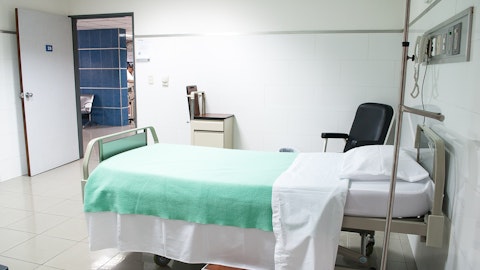In this article, we discuss the 12 best pharma stocks to buy now. You can skip our detailed analysis of the pharmaceutical sector and its outlook this year, and go directly to read the 5 Best Pharma Stocks To Buy Now.
Shortly following the onset of the COVID-19 pandemic, it became evident that the world would remain trapped in a never-ending cycle of lockdowns and crises unless new treatments, especially vaccines, were developed. The healthcare industry as a whole has experienced profound changes over time, particularly in the wake of the pandemic. Progress in medical technology, pharmaceuticals, and treatment methodologies has revolutionized patient care and results. Pharmaceutical companies especially, have garnered significant public attention, as the urgency to deliver results rapidly intensified.
Pharmaceutical companies are often categorized as defensive because they produce essential products for health maintenance and illness treatment. Demand for these products tends to remain relatively stable even during economic downturns. Notably, the sector provided favorable returns to investors in the past year, a period marked by the S&P 500’s weakest annual performance since 2008. During the period from December 2021 to December 2022, the NYSE Arca Pharmaceutical Index exhibited a gain of 4.91%, in stark contrast to the S&P 500’s significant 19.4% decline. In the past 5 years, the index has risen by 57.08%.
Don’t miss out on: 12 Best Health Insurance Stocks to Buy
According to a report by Grand View Research, the global pharmaceutical manufacturing market was valued at approximately $516.48 billion in 2022 and is projected to experience a compound annual growth rate (CAGR) of 7.63% from 2023 to 2030. The rising number of drug approvals sanctioned by regulatory authorities is anticipated to propel advancements in drug manufacturing processes. Notably, in 2022, the FDA greenlit 37 novel drugs, signifying a favorable trend. Furthermore, the pharmaceutical sector has observed a significant increase in mergers and acquisitions (M&As) in recent years. Well-established companies are pursuing consolidation strategies to fortify their market standing within the fiercely competitive landscape.
Despite heightened antitrust scrutiny by regulatory authorities, mergers and acquisitions continue to be a valuable means of transformation. According to PwC, Large-cap pharmaceutical firms persist in their efforts to invest in midsize biotech companies to address gaps in their product pipelines. Meanwhile, assessments of portfolios and the divestiture of non-core assets remain significant considerations. The global pharmaceutical industry stands to experience substantial growth in the future. In that same vein, some of the best pharma stocks in the industry include the likes of Pfizer Inc. (NYSE:PFE), Eli Lilly and Company (NYSE:LLY), and Johnson & Johnson (NYSE:JNJ), among others listed below.

A display of drug products in a specialty pharmacy, to demonstrate the widespread availability of the company’s products.
Our Methodology
To compile our list of the best pharma stocks to buy, we scoured through Insider Monkey’s Q2 2023 database to identify the leaders in the pharmaceutical industry based on hedge fund sentiment. The following companies, ranked according to the number of hedge funds that hold their shares, all offer pharmaceutical products and services within the United States, and/or internationally.
11. Cardinal Health, Inc. (NYSE:CAH)
Number of Hedge Fund Holders: 44
Cardinal Health, Inc. (NYSE:CAH) stands as a U.S.-based multinational healthcare services enterprise, ranking as one of the highest revenue-generating companies in the United States. Situated in Dublin, Ohio, the company specializes in the distribution of pharmaceuticals and medical products, extending its services to over 100,000 locations.
On August 9, Cardinal Health, Inc. (NYSE:CAH) announced an unchanged quarterly dividend of $0.5006 per share, consistent with its prior dividend. As of October 24, the stock displayed a dividend yield of 2.13%. Notably, the company has maintained a pattern of raising dividends consistently over the past 37 years.
At the conclusion of the second quarter in 2023, 44 hedge funds, as reported by Insider Monkey, held positions in Cardinal Health, Inc. (NYSE:CAH). This figure marks a decrease from the 50 hedge funds in the previous quarter. The combined value of these holdings surpassed $1.36 billion.
Much like Pfizer Inc. (NYSE:PFE), Eli Lilly and Company (NYSE:LLY), and Johnson & Johnson (NYSE:JNJ), Cardinal Health, Inc. (NYSE:CAH) ranks as one of the best pharma stocks to invest in.
10. Gilead Sciences, Inc. (NASDAQ:GILD)
Number of Hedge Fund Holders: 56
Gilead Sciences, Inc. (NASDAQ:GILD), a U.S.-based biopharmaceutical company headquartered in Foster City, California, is dedicated to the research and development of antiviral drugs utilized in treating conditions such as HIV/AIDS, hepatitis B, hepatitis C, influenza, and COVID-19. Some of their notable medications include ledipasvir/sofosbuvir and sofosbuvir.
On October 17, Gilead Sciences, Inc. (NASDAQ:GILD) and Assembly Biosciences, a biotechnology company specializing in cutting-edge antiviral therapeutics for critical viral diseases, disclosed their collaboration for a 12-year duration. The partnership aims to drive the advancement of novel antiviral treatments, initially concentrating on Assembly Bio’s well-established areas of expertise, which include herpesviruses, hepatitis B virus (HBV), and hepatitis D virus (HDV).
Insider Monkey’s Q2 2023 survey covering 910 hedge funds revealed that 56 had bought and owned Gilead Sciences, Inc. (NASDAQ:GILD)’s shares. Peter Rathjens, Bruce Clarke, and John Campbell’s Arrowstreet Capital is the biggest shareholder among these since it owns $684 million worth of shares.
ClearBridge Dividend Strategy made the following comment about Gilead Sciences, Inc. (NASDAQ:GILD) in its Q3 2023 investor letter:
“During the quarter we initiated positions in two new names: T-Mobile and Gilead Sciences, Inc. (NASDAQ:GILD). Gilead Sciences is a large biopharmaceutical company we have long followed given its dominant position in HIV treatment and strong intellectual property position. With pandemic-induced distortions on quarterly financials largely in the rearview mirror (Veklury — aka Remdesivir — was an overnight success as an antiviral treatment of COVID), we believe Gilead’s organic revenue growth potential over the next many years is in the mid-single digits. Gilead’s growth should be stable, as the company has no major patent expirations until the early 2030s.
While less growthy than some high-flying drug classes (e.g., diabetes/obesity), Gilead’s current valuation is undemanding, with a P/E barely in the double digits. We tend to shy away from health care investments whose valuation is dependent on pipeline drugs transforming into a large commercial opportunity, given the uncertain nature of drug discovery and the binary characteristic of the stock reactions. In Gilead’s case, we believe the market is ascribing virtually no value to its existing pipeline, in effect providing us with a “free” call option. Lastly, Gilead’s 4% (and growing) coupon should offer considerable downside support amid a more challenging market backdrop.”
9. Amgen Inc. (NASDAQ:AMGN)
Number of Hedge Fund Holders: 57
Amgen Inc. (NASDAQ:AMGN) is a worldwide biopharmaceutical enterprise engaged in the exploration, creation, production, and dissemination of human therapeutics. One of best pharma stocks to keep note of, the company’s primary areas of emphasis encompass oncology/hematology, inflammation, bone health, cardiovascular diseases, nephrology, and neuroscience. As of October 24, the company extends a quarterly dividend of $2.13 per share, contributing to a dividend yield of 3.11%.
The number of hedge funds tracked by Insider Monkey reported having stakes in Amgen Inc. (NASDAQ:AMGN) stood at 57 in Q2 2023, the same as in the previous quarter. The consolidated value of these stakes is over $1.56 billion. With over 1.6 million shares, Two Sigma Advisors was the company’s leading stakeholder in Q2.
Aristotle Capital Value Equity Strategy made the following comment about Amgen Inc. (NASDAQ:AMGN) in its Q3 2023 investor letter:
“Amgen Inc. (NASDAQ:AMGN), the biopharmaceutical company, was the top contributor for the quarter. The company continues to leverage its innovative platform to strengthen its product portfolio, offset maturing products, such as Epogen and Neulasta, and increase market share. Over the past year, Amgen has reported double‐digit volume growth, operating margin expansion to over 40% and record levels of sales for cholesterol drug Repatha, bone‐strengthening drug Prolia and cancer drug Blincyto. Additionally, the company remains well positioned to benefit from the continued development and commercialization of biosimilars such as Amgevita, the first biosimilar to Humira, and the successful integration of Otezla to bolster its inflammation segment. Lastly, the FTC agreed to allow Amgen to proceed with its $27.8 billion acquisition of Horizon Therapeutics. We note that this is yet another unsuccessful attempt by the FTC to block an M&A transaction of one of our holdings (see below re: Activision Blizzard). The transaction closed on October 6, 2023 and brings expertise in rare disease therapies (including bulging eye‐drug Tepezza), as well as adds to Amgen’s immunology portfolio.”
8. McKesson Corporation (NYSE:MCK)
Number of Hedge Fund Holders: 60
McKesson Corporation (NYSE:MCK) is a U.S.-based company specializing in pharmaceutical distribution and offering health information technology, medical supplies, and care management solutions. Notably, the company is responsible for supplying one-third of all pharmaceuticals utilized in North America and boasts a workforce of over 78,000 employees.
On July 24, the company revealed a notable 15% increase in its quarterly dividend, now at $0.62 per share, which underscores the company’s consistent growth in dividends for seven consecutive years. As of October 24, the stock carries a dividend yield of 0.55%.
The number of hedge funds tracked by Insider Monkey owning stakes in McKesson Corporation (NYSE:MCK) stood at 60 in Q2 2023, which remained unchanged from the previous quarter. The consolidated value of these stakes is over $3.1 billion.
Baron Health Care Fund made the following comment about McKesson Corporation (NYSE:MCK) in its Q3 2023 investor letter:
“Partially offsetting the above was favorable stock selection in pharmaceuticals and health care distributors along with cash exposure in a declining market. Strength in pharmaceuticals and health care distributors was driven by gains from Lilly and McKesson Corporation (NYSE:MCK). McKesson’s stock performed well due to strong financial results in the company’s pharmaceutical distribution and prescription technology solutions businesses, driven in part by higher volumes of GLP-1 medicines and prior authorization technology services related to GLP-1 medicines.”
7. Bristol-Myers Squibb Company (NYSE:BMY)
Number of Hedge Fund Holders: 66
Bristol-Myers Squibb Company (NYSE:BMY) is a global biopharmaceutical enterprise involved in the extensive spectrum of research, development, licensing, manufacturing, marketing, and distribution of biopharmaceutical products. These products are designed to address various medical conditions, encompassing hematology, oncology, cardiovascular, immunology, fibrotic, and neuroscience diseases. Arguably one of the best pharma stocks in the market, Bristol-Myers Squibb Company (NYSE:BMY) announced a quarterly dividend of $0.57 per share on September 20, maintaining consistency with previous payouts. Shareholders of record as of October 6 will receive this dividend on November 1.
By the end of this year’s second quarter, 66 out of the 910 hedge funds part of Insider Monkey’s research were Bristol-Myers Squibb Company (NYSE:BMY)’s investors. Richard S. Pzena’s Pzena Investment Management is the largest shareholder among these since it owns 4.3 million shares that are worth $277 million.
RGA Investment Advisors made the following comment about Bristol-Myers Squibb Company (NYSE:BMY) in its Q3 2022 investor letter:
“Bristol-Myers Squibb Company (NYSE:BMY), which we referenced above, boasts a double digit free cash flow yield that gets divided roughly equally between repurchases, a dividend and M&A in what is the best environment for acquisitions perhaps ever. In 2019, BMY acquired Celgene, who had one of the better corporate development programs in the industry. We view this as a great outlet for us as generalists considering a company like BMY should truly thrive with the ability to acquire outstanding assets and science at depressed valuations. We touched on the Turning Point acquisition above and we expect the company to be increasingly active in the M&A landscape. Importantly, Celgene also came to BMY with a phenomenal CAR-T platform. CAR-T is a cell therapy that activates the body’s immune system to target cancers. This will be a key growth vector alongside M&A in overcoming the company’s patent cliff.”
6. CVS Health Corporation (NYSE:CVS)
Number of Hedge Fund Holders: 66
CVS Health Corporation (NYSE:CVS) is a U.S.-based healthcare entity with its headquarters in the country, overseeing an extensive network of retail pharmacies and clinics nationwide. The company manages a variety of brands, including CVS Pharmacy, a retail pharmacy chain; CVS Caremark, a pharmacy benefits manager, and Aetna, a health insurance provider.
In the second quarter of 2023, CVS Health Corporation (NYSE:CVS) disclosed revenues of approximately $89 billion, signifying a noteworthy 10.3% increase in comparison to the same period in the previous year. Furthermore, year-to-date, the company generated an operating cash flow of $13.3 billion and allocated $795 million to shareholders in the form of dividends during the same quarter.
At the conclusion of the second quarter in 2023, data from Insider Monkey’s database, which tracks 943 hedge funds, indicated that 66 hedge funds held positions in CVS Health Corporation (NYSE:CVS). The most prominent stakeholder among them was John Overdeck and David Siegel’s Two Sigma Advisors, possessing a substantial stake in the company valued at $398.9 million.
Coho Partners Relative Value Equity Fund made the following comment about CVS Health Corporation (NYSE:CVS) in its second quarter 2023 investor letter:
“In December of 2017, CVS Health Corporation (NYSE:CVS) agreed to buy Aetna, which broadened its offering by entering the managed care business. CVS has been moving its portfolio to a more value-based outcome model, and Aetna was a major move in that direction. We were willing to accept the leverage that came with the deal because CVS has a very cash generative model, and we anticipated the free cash flow would enable the company to de-lever fairly quickly.
By mid-2022, CVS was in a position to use the free cash flow that had been going to debt repayment to do bolt-on deals to further prepare for the value-based outcome model and/or return more cash to shareholders in the form of higher dividends or share repurchases. However, CVS lost a “star” in its largest Medicare plan in late 2022 and this will adversely impact earnings in 2024. This was a surprise and disappointment to us, but management should be able to regain the “star” in the back half of 2023, which will then give the company a nice tailwind in 2025…” (Click here to read the full text)
CVS Health Corporation (NYSE:CVS) joins the ranks of Pfizer Inc. (NYSE:PFE), Eli Lilly and Company (NYSE:LLY), and Johnson & Johnson (NYSE:JNJ) as one of the best pharma stocks investors should keep on their radars.
Click to continue reading and see 5 Best Pharma Stocks To Buy Now.
Suggested articles:
- 12 Best Performing Biotech Stocks in 2023
- 12 Best Health Insurance Stocks to Buy
- 12 Cheap Biotech Stocks Smart Investors Are Piling Into
Disclosure. None. 11 Best Pharma Stocks To Buy Now is originally published on Insider Monkey.




